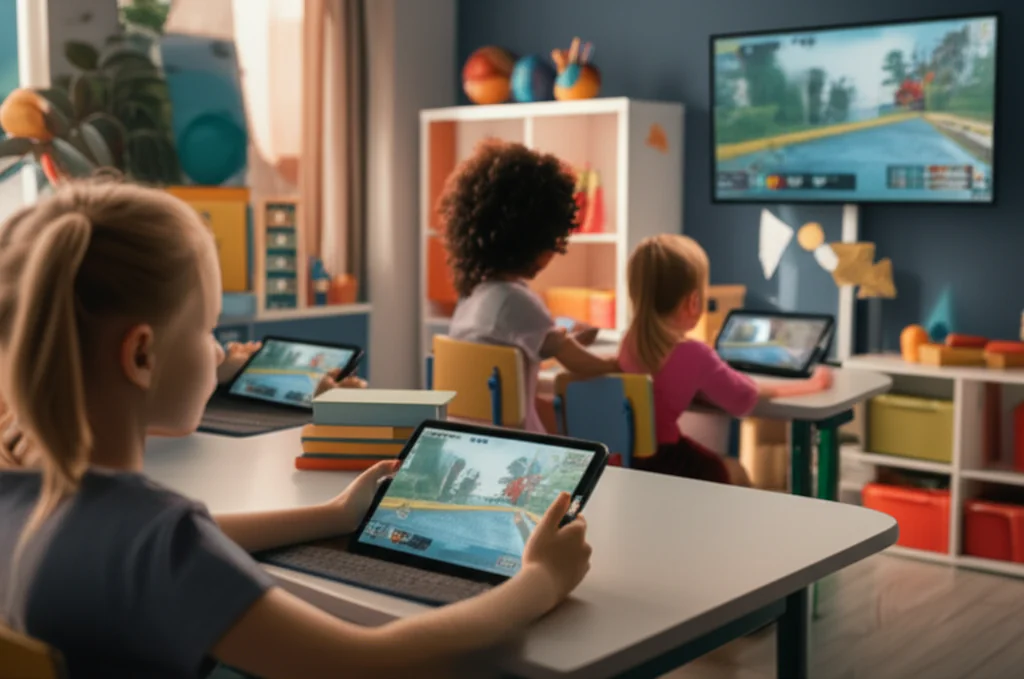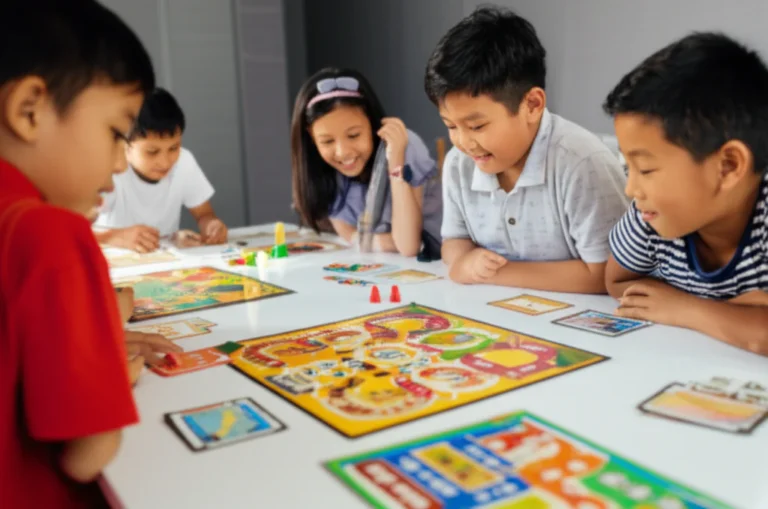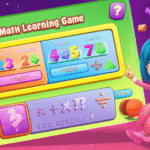
Ever wondered how a website can turn your child’s screen time into a powerhouse of learning and fun? Welcome to the world of Funbrain — the educational gaming platform that’s been delighting kids and parents alike for over two decades! From math challenges that feel like arcade games to interactive stories starring beloved characters like Diary of a Wimpy Kid, Funbrain transforms traditional learning into an engaging digital playground. But what exactly makes Funbrain so special, and is it the right fit for your family or classroom? Stick around — we’ll reveal insider tips, real family stories, and a detailed review that answers all your burning questions.
Did you know that kids who engage with educational games like those on Funbrain show measurable improvements in problem-solving and reading skills? 🎯 Later in this article, we’ll explore how Funbrain’s carefully crafted games align with school curricula and why educators swear by it as a supplemental learning tool. Plus, we’ll compare it to other popular platforms so you can decide which one truly fits your child’s learning style.
Key Takeaways
- Funbrain offers 100+ interactive games covering math, reading, logic, and more for kids aged preschool to grade 8.
- The platform combines education with entertainment, featuring popular books and comics alongside curriculum-aligned games.
- User-friendly and accessible on multiple devices, Funbrain supports independent learning and diverse learning styles.
- It is free to use and complies with strict online safety standards, making it a trusted choice for parents and educators.
- While some users note occasional technical glitches, Funbrain’s rich content library and engaging gameplay make it a top pick for educational gaming in 2025.
Ready to explore more? Dive into our full review and discover how to make the most of Funbrain’s learning magic!
Table of Contents
- ⚡️ Quick Tips and Facts: Your Funbrain Fast-Track! 🚀
- 🤔 What Exactly Is Funbrain? Unpacking the Educational Gaming Phenomenon
- 🕰️ The Story Behind Funbrain: A Journey Through Educational Gaming History
- 🌟 Key Features That Make Funbrain Shine: More Than Just Games!
- 🎮 Dive into Funbrain’s Game Galaxy: Our Top Picks & Categories!
- 🧠 Beyond the Fun: How Funbrain Boosts Brainpower & Learning Skills
- 🧑 💻 Navigating Funbrain: A Parent & Child’s Perspective on Usability
- 🎯 Who’s Funbrain For? Unpacking Its Appeal for Kids, Parents, and Teachers
- ⚖️ The Good, The Bad, and The Brainy: A Balanced Funbrain Review
- 🔒 Keeping Kids Safe: Funbrain’s Approach to Online Security & Privacy
- 🆚 Funbrain vs. The World: How It Stacks Up Against Other Educational Platforms
- 💡 Maximizing the Magic: Expert Tips for Parents & Educators Using Funbrain
- 💖 Our Funbrain Adventures: Real Stories from Learning Game™ Families
- Conclusion: Our Final Verdict on Funbrain as a Learning Tool
- Recommended Links: Explore More Educational Fun!
- FAQ: Your Burning Funbrain Questions Answered!
- Reference Links: Our Sources & Further Reading
⚡️ Quick Tips and Facts: Your Funbrain Fast-Track! 🚀
To get started with Funbrain, here are some quick tips and facts:
- Funbrain is an online platform offering over 100 interactive games for kids aged preschool through grade 8.
- The platform covers a wide range of subjects, including math, reading, and literacy.
- Funbrain also provides access to popular books and comics, such as Diary of a Wimpy Kid.
- The games and activities are designed to be both fun and educational, helping kids develop their skills in a engaging way.
- You can learn more about how to use Funbrain effectively by checking out our article on How to Play Funbrain: Make Learning Fun with Learning Games! 2024.
🤔 What Exactly Is Funbrain? Unpacking the Educational Gaming Phenomenon
Funbrain is an educational gaming platform designed for kids, offering a variety of interactive games, videos, and books. The platform aims to make learning fun and engaging, covering subjects like math, reading, and literacy. With a wide range of content suitable for different age groups, Funbrain is a popular choice among parents and educators. For more information on educational games like Funbrain, visit our Educational Games section.
🕰️ The Story Behind Funbrain: A Journey Through Educational Gaming History

The concept of Funbrain dates back to the early days of educational gaming. As technology advanced, the platform evolved to include a broader range of interactive games and activities. Today, Funbrain is a leading online destination for kids to learn and have fun. You can explore more about the history of educational gaming on our Game-based Learning page.
🌟 Key Features That Make Funbrain Shine: More Than Just Games!
Here are some key features that make Funbrain stand out:
- Interactive Games: Funbrain offers a wide range of interactive games that cover various subjects, including math, reading, and literacy.
- Videos and Books: The platform provides access to popular books and comics, as well as educational videos.
- Age-Appropriate Content: Funbrain offers content suitable for different age groups, from preschool to grade 8.
📚 Beyond Games: Funbrain’s Reading & Comics Corner
Funbrain’s reading and comics corner is a treasure trove of popular books and comics, including Diary of a Wimpy Kid. Kids can enjoy reading and learning at the same time, making it an excellent way to develop their literacy skills. Check out our Edutainment section for more on how entertainment and education can come together.
📝 Interactive Learning: Worksheets & Printables for Offline Fun
In addition to online games and activities, Funbrain also offers interactive worksheets and printables that kids can use offline. This feature allows kids to continue learning and having fun even without an internet connection. You can find more resources on interactive learning on our Educational Apps page.
🎮 Dive into Funbrain’s Game Galaxy: Our Top Picks & Categories!
Here are some of our top picks and categories:
- Math Marvels: Sharpening Skills with Numbers
- Funbrain offers a variety of math games that help kids develop their math skills in a fun and interactive way.
- Reading Rockets: Boosting Literacy Through Play
- The platform provides games and activities that help kids improve their reading skills and develop a love for reading.
- Arcade Adventures: Fun for Brain Breaks & Beyond
- Funbrain’s arcade games are perfect for brain breaks and offer a fun way for kids to relax and have fun.
- Strategy & Logic Challenges: Thinking Outside the Box
- The platform offers strategy and logic games that help kids develop their critical thinking skills and problem-solving abilities.
🧠 Beyond the Fun: How Funbrain Boosts Brainpower & Learning Skills
Funbrain is more than just a gaming platform – it’s a tool that helps kids develop their brainpower and learning skills. Here’s how:
- Curriculum Alignment: Funbrain’s content is aligned with school curricula, making it an excellent supplement to traditional learning.
- Cognitive Development: The platform’s games and activities help kids develop their cognitive skills, including problem-solving, critical thinking, and creativity.
Curriculum Alignment: Does Funbrain Match School Standards?
Funbrain’s content is designed to align with school curricula, ensuring that kids are learning and developing skills that are relevant to their academic goals. You can learn more about curriculum alignment and educational standards on our Game-based Learning Research page.
Developing Key Cognitive Abilities: From Problem-Solving to Creativity
Funbrain’s games and activities are designed to help kids develop a range of cognitive abilities, including:
- Problem-Solving: Funbrain’s games help kids develop their problem-solving skills, which are essential for academic success.
- Critical Thinking: The platform’s activities encourage kids to think critically and make informed decisions.
- Creativity: Funbrain’s games and activities help kids develop their creative skills, which are essential for innovation and self-expression.
🧑 💻 Navigating Funbrain: A Parent & Child’s Perspective on Usability
Here’s what parents and kids have to say about navigating Funbrain:
- User Interface: Funbrain’s user interface is designed to be kid-friendly, making it easy for kids to navigate and find their favorite games and activities.
- Accessibility: The platform is accessible on a range of devices, including desktops, laptops, and mobile devices.
User Interface & Experience: Is It Kid-Friendly?
Funbrain’s user interface is designed with kids in mind, featuring bright colors, fun characters, and easy-to-use navigation. You can learn more about kid-friendly design on our Educational Games page.
Accessibility & Device Compatibility: Play Anywhere, Anytime?
Funbrain is compatible with a range of devices, including desktops, laptops, and mobile devices. This means that kids can play and learn anywhere, anytime. Check out our Educational Apps section for more on device compatibility.
🎯 Who’s Funbrain For? Unpacking Its Appeal for Kids, Parents, and Teachers
Funbrain is designed for kids aged preschool through grade 8, making it an excellent resource for parents and teachers looking for educational content. Here’s why:
- Age-Appropriate Content: Funbrain offers content suitable for different age groups, ensuring that kids are engaged and challenged.
- Educational Value: The platform’s games and activities are designed to develop kids’ cognitive skills, making it an excellent supplement to traditional learning.
The K-8 Sweet Spot: Age-Appropriate Content
Funbrain’s content is designed to cater to kids aged preschool through grade 8, ensuring that kids are engaged and challenged. You can learn more about age-appropriate content on our Edutainment page.
Benefits for Different Learning Styles
Funbrain’s games and activities cater to different learning styles, including visual, auditory, and kinesthetic learners. This ensures that kids can learn and develop skills in a way that suits their individual needs. Check out our Game-based Learning section for more on learning styles.
⚖️ The Good, The Bad, and The Brainy: A Balanced Funbrain Review
Here’s a balanced review of Funbrain, highlighting its strengths and weaknesses:
- The Good: Funbrain offers a wide range of interactive games and activities that are both fun and educational.
- The Bad: Some users have reported technical issues with the platform, including slow loading times and glitches.
✅ What We Love About Funbrain
We love Funbrain’s commitment to making learning fun and engaging. The platform’s games and activities are designed to develop kids’ cognitive skills, making it an excellent supplement to traditional learning. You can learn more about the benefits of game-based learning on our Game-based Learning Research page.
❌ Where Funbrain Could Improve
While Funbrain is an excellent platform, there are areas for improvement. Some users have reported technical issues, including slow loading times and glitches. The platform could also benefit from more frequent updates and new content. Check out our Educational Games section for more on what makes a great educational game.
🔒 Keeping Kids Safe: Funbrain’s Approach to Online Security & Privacy
Funbrain takes online security and privacy seriously, ensuring that kids are protected while using the platform. Here’s how:
- Data Collection: Funbrain collects data on user activity, but this data is used solely for improving the platform and providing a better user experience.
- COPPA Compliance: Funbrain is compliant with the Children’s Online Privacy Protection Act (COPPA), ensuring that kids’ personal information is protected.
Data Collection & COPPA Compliance
Funbrain is committed to protecting kids’ personal information and is compliant with COPPA. You can learn more about online safety and COPPA compliance on our Educational Apps page.
Advertising on Funbrain: What Parents Need to Know
Funbrain features advertising on its platform, but this advertising is carefully curated to ensure that it is suitable for kids. Parents can rest assured that their kids are not exposed to inappropriate or harmful content. Check out our Edutainment section for more on kid-friendly advertising.
🆚 Funbrain vs. The World: How It Stacks Up Against Other Educational Platforms
Here’s how Funbrain compares to other educational platforms:
- Funbrain vs. ABCya!: Both platforms offer interactive games and activities, but Funbrain has a more extensive range of content.
- Funbrain vs. PBS Kids Games: Funbrain offers more games and activities than PBS Kids Games, but PBS Kids Games has a stronger focus on educational content.
Funbrain vs. ABCya!
Funbrain and ABCya! are both popular educational platforms, but they have some key differences. Funbrain offers a wider range of content, including games, videos, and books. You can learn more about ABCya! and other educational platforms on our Educational Games page.
Funbrain vs. PBS Kids Games
Funbrain and PBS Kids Games are both excellent educational platforms, but they have different strengths. Funbrain offers more games and activities, while PBS Kids Games has a stronger focus on educational content. Check out our Educational Apps section for more on PBS Kids Games.
Funbrain vs. Cool Math Games
Funbrain and Cool Math Games are both popular educational platforms, but they have some key differences. Funbrain offers a wider range of content, including games, videos, and books, while Cool Math Games has a stronger focus on math games. You can learn more about Cool Math Games on our Game-based Learning page.
💡 Maximizing the Magic: Expert Tips for Parents & Educators Using Funbrain
Here are some expert tips for parents and educators using Funbrain:
- Integrate Funbrain into Homework & Lesson Plans: Funbrain’s games and activities can be integrated into homework and lesson plans to make learning more engaging and fun.
- Encourage Balanced Screen Time: Parents and educators should encourage kids to maintain a balance between screen time and other activities to ensure overall well-being.
Integrating Funbrain into Homework & Lesson Plans
Funbrain’s games and activities can be integrated into homework and lesson plans to make learning more engaging and fun. You can learn more about integrating educational games into lesson plans on our Game-based Learning page.
Encouraging Balanced Screen Time
Parents and educators should encourage kids to maintain a balance between screen time and other activities to ensure overall well-being. Check out our Educational Apps section for more on balanced screen time.
💖 Our Funbrain Adventures: Real Stories from Learning Game™ Families
We’ve had the pleasure of hearing from many families who have used Funbrain and seen the positive impact it has had on their kids’ learning. Here are some real stories from Learning Game™ families:
- Improved Math Skills: One family reported that their child’s math skills improved significantly after using Funbrain’s math games.
- Increased Reading Confidence: Another family reported that their child’s reading confidence increased after using Funbrain’s reading games and activities.
Conclusion: Our Final Verdict on Funbrain as a Learning Tool

After diving deep into the world of Funbrain, we at Learning Game™ can confidently say that Funbrain is a standout educational platform that brilliantly blends fun and learning. Its vast library of interactive games, videos, and books caters to a broad age range (preschool through grade 8), making it a versatile tool for parents, teachers, and kids alike.
Positives ✅
- Wide variety of content: From math and reading games to popular books like Diary of a Wimpy Kid, Funbrain offers something for every learner.
- Curriculum-aligned and age-appropriate: Content is thoughtfully designed to complement school learning and suit different developmental stages.
- User-friendly interface: Kids find it easy and engaging to navigate, encouraging independent learning.
- Accessible across devices: Whether on desktop or mobile, Funbrain lets kids learn anytime, anywhere.
- Strong safety and privacy policies: COPPA compliance and curated advertising ensure a safe environment for children.
Negatives ❌
- Occasional technical glitches and slow loading reported by users.
- Could benefit from more frequent content updates to keep the platform fresh and exciting.
- Some parents may want ad-free options, which Funbrain currently does not offer.
Final Thoughts
If you’re looking for a free, comprehensive, and engaging educational platform that supports a variety of learning styles and subjects, Funbrain is a fantastic choice. It’s especially great as a supplement to traditional schooling or as a homeschooling resource. While it’s not perfect, its strengths far outweigh the drawbacks, and with mindful use, it can be a powerful ally in your child’s educational journey.
Wondering which games to start with or how to integrate Funbrain into your daily routine? Don’t miss our expert tips earlier in this article and our detailed guide on How to Play Funbrain: Make Learning Fun with Learning Games! 2024 🎮.
Recommended Links: Explore More Educational Fun!
Ready to explore Funbrain and related educational resources? Here are some handy shopping and resource links to get you started:
-
Funbrain Games & Platform:
Funbrain Official Website | Amazon Search: Funbrain Educational Games -
Popular Books on Funbrain (Diary of a Wimpy Kid Series):
Diary of a Wimpy Kid on Amazon | Jeff Kinney Official Site -
ABCya! Educational Games:
ABCya! Official Website -
PBS Kids Games:
PBS Kids Official Website -
Cool Math Games:
Cool Math Games Official Website
FAQ: Your Burning Funbrain Questions Answered!

Are Funbrain games suitable for homeschooling and online learning programs?
Absolutely! Funbrain’s curriculum-aligned content and broad subject coverage make it an excellent resource for homeschooling families and online learning programs. Its interactive games and reading materials can supplement lesson plans and provide engaging practice outside traditional textbooks.
What are some popular Funbrain games for children of different age groups?
- Preschool to Grade 2: Penguin Drop, Math Baseball, Don’t Gross Out the World
- Grades 3 to 5: States Of Play, What on Earth?!, Chess
- Grades 6 to 8: Tinybop’s Mammals, InvestiGators, Crackerdiles Crackdown
These games are designed to challenge and entertain kids at various developmental stages.
How does Funbrain help kids develop problem-solving skills and critical thinking?
Many Funbrain games require strategic thinking, pattern recognition, and decision-making. For example, Chess develops foresight and planning, while States Of Play enhances geography knowledge through interactive challenges. These activities nurture cognitive skills essential for academic and real-world success.
Can Funbrain games be used in the classroom to support learning?
Yes! Teachers often incorporate Funbrain games as engaging supplements to lessons. The platform’s alignment with school curricula and its ability to cater to diverse learning styles make it a valuable classroom tool. Plus, the games can be used for individual or group activities.
Read more about “15 Best Free Learning Games for Children to Boost Brainpower 🎮 (2025)”
What types of educational games are available on Funbrain?
Funbrain offers a diverse range, including:
- Math games (e.g., Math Baseball, Penguin Drop)
- Reading and literacy games (e.g., Diary of a Wimpy Kid interactive stories)
- Logic and strategy games (e.g., Chess)
- Science and geography games (e.g., Tinybop’s Mammals, States Of Play)
How do Funbrain games make learning fun and interactive?
By combining colorful graphics, engaging storylines, and interactive challenges, Funbrain games transform traditional learning into playful exploration. Kids receive instant feedback, rewards, and encouragement, which boosts motivation and retention.
What are the benefits of playing Funbrain games for kids?
- Improved academic skills in math, reading, and science
- Enhanced problem-solving and critical thinking abilities
- Increased motivation and engagement with learning
- Development of independent learning habits
- Safe and age-appropriate digital environment
Read more about “15 Best Kids Games Online to Play and Learn in 2025 🎮✨”
Is it safe for children to use Funbrain?
Yes. Funbrain complies with COPPA regulations to protect children’s privacy. It uses curated advertising suitable for kids and does not collect unnecessary personal information. Parents can feel confident about their child’s safety on the platform.
Read more about “What does Funbrain do? … 🎮”
What is Funbrain used for?
Funbrain is used as an educational platform to support and enhance children’s learning through interactive games, videos, and books. It helps kids practice academic skills in a fun and engaging way.
What is the point of Funbrain games?
The primary goal is to make learning enjoyable while reinforcing key skills in math, reading, and other subjects. Funbrain games motivate kids to practice and master concepts through play.
Read more about “What Game Can Help You Learn? 10 Fun Picks! 🎮”
What age group is Funbrain game designed for?
Funbrain targets children from preschool through 8th grade, roughly ages 4 to 14, with content tailored to different developmental stages.
Read more about “How to Play Funbrain: Make Learning Fun with Learning Games! … 🎮”
How does Funbrain make learning fun for kids?
By integrating game mechanics like scoring, levels, and rewards with educational content, Funbrain turns learning into an adventure. The platform’s colorful design and interactive challenges keep kids engaged and eager to learn more.
Read more about “What are the Pros and Cons of Funbrain? … ✅”
Are Funbrain games educational and entertaining?
Definitely! Funbrain strikes a balance between education and entertainment, ensuring kids are learning while having a blast.
What subjects can children learn through Funbrain games?
Subjects include:
- Math
- Reading and literacy
- Science
- Geography
- Logic and strategy
Read more about “Discover 15 Amazing Kids Games Free to Spark Fun and Learning in 2024! 🎮”
Is Funbrain free to use for learning games?
Yes, Funbrain is free to use, making it accessible to families and schools without extra cost.
Read more about “Why Was PBS Kids Go Shut Down? The Full Story (2025) 🎬”
Can Funbrain games help improve math skills?
Yes. Many games focus on math concepts such as addition, subtraction, multiplication, division, and problem-solving, helping kids build strong math foundations.
Read more about “15 Best Free Online Games for Kids – No Download Needed (2025) 🎮”
What are the best Funbrain games for classroom learning?
Games like Math Baseball, States Of Play, and Chess are favorites among educators for their curriculum relevance and engagement value.
Reference Links: Our Sources & Further Reading
- Funbrain Official Website: https://www.funbrain.com/
- Funbrain Games Catalog: https://www.funbrain.com/games
- FunBrain’s Word Turtle and Related Games: https://www.funbrain.com/content/cgi-bin/wd.cgi?A1=showcat&A2=1
- COPPA Compliance Information: https://www.ftc.gov/legal-library/browse/rules/childrens-online-privacy-protection-rule-coppa
- Diary of a Wimpy Kid Official Site: https://wimpykid.com/
- ABCya! Educational Games: https://www.abcya.com/
- PBS Kids Games: https://pbskids.org/games/
- Cool Math Games: https://www.coolmathgames.com/
For more insights on educational games and game-based learning, visit our Educational Games and Game-based Learning Research pages.





